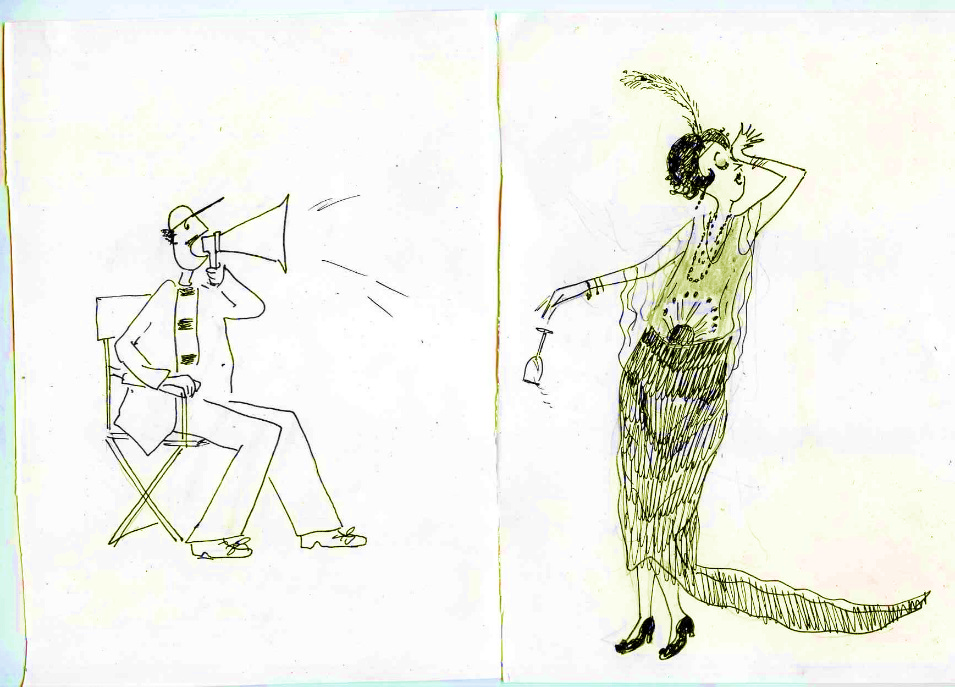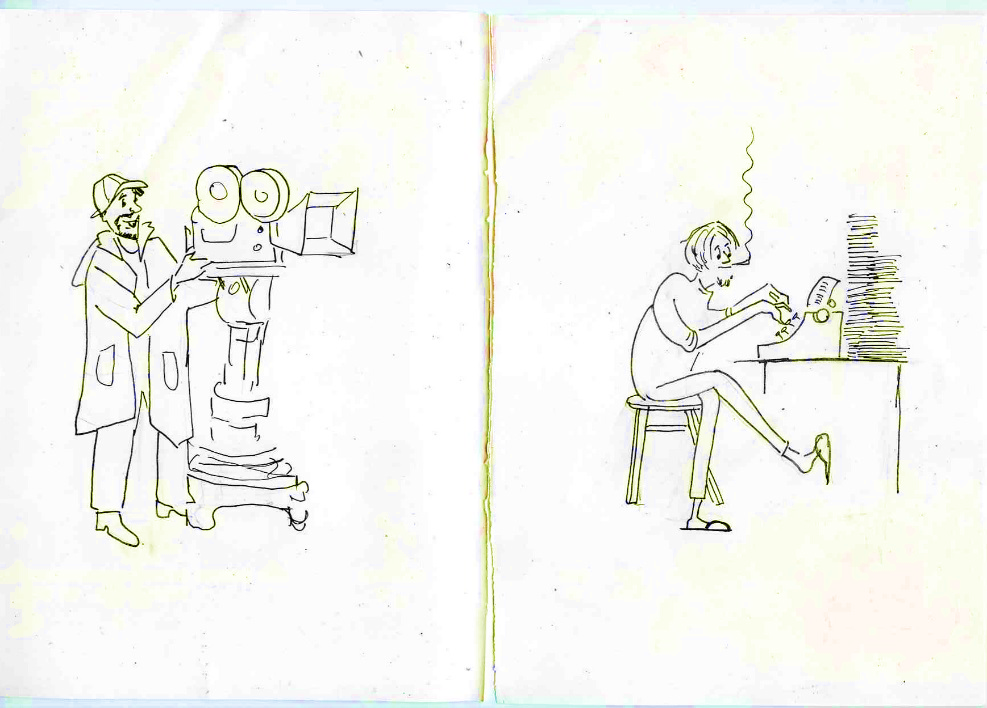ВУЗ: Не указан
Категория: Не указан
Дисциплина: Не указана
Добавлен: 06.09.2024
Просмотров: 120
Скачиваний: 0
Exercise 36. Make the sentences negative.
Film actors rehearse as much as stage actors.
The success of an actor depends only on his talent.
The film director regulates the lights and places the camera himself.
The theatre enables the spectator to see tiny details of the actors’ faces.
The director usually takes a scene only once.
Exercise 37. Look through the article to find answers.
1. Is the work of a film actor the same as the work of the stage actor?
2. What is essential for a stage actor?
3. What are the advantages of the cinema?
4. How does a film director work with an actor on the set?
5. What is the task of a good film actor?
6. Who regulates the lights?
7. Who records the sound?
8. What signal does the director of photography usually give when everybody is ready to start
the shooting?
9. Why is it essential to take every scene more than once?
Word-building
Приставка re- имеет значение “снова, ещё раз”. Часто соответствует русской
приставке пере-.
В словах с приставкой re- обычно бывает два ударения: на приставке и на основе слова.
to write – писать to rewrite – переписать
to take an exam – сдавать экзамен to retake an exam – пересдавать экзамен
to send – отправить to resend – отправить ещё раз
Exercise 38. Translate into Russian.
revisit a town 2. redo the job 3. rethink a decision 4. resell prints
reload the page 6. reread an article 7. reuse the props 8. renew discussions
recycle glass 10. reconstruct buildings 11. redecorate a flat 12. rework characters
Exercise 39. Choose the appropriate word and use it in the right form.
reread rewrite redo retake resend retrain re-open
If a student doesn’t pass an exam, he can … it a week later.
The director is not happy with the final scene. He asks me … it.
He is an engineer, but he wants … as an economist.
I’m … “Hamlet”.
… the message, please.
The palace closes when humidity is higher than 80 %. It … when humidity gets lower.
There are too many mistakes in my report. I must … it.
Reading and communication
Exercise 40. a) Discuss the following questions:
Do you think that a good fiction writer always makes a good screenwriter?
What makes a good script?
Can we make a film without any script?
b) Read the article and see if the author has the same opinion as you. Make sure you know all the highlighted words.
|
Writing a Screenplay
|
|
|
“Audiences
don’t know somebody sits down and writes a picture. They think
the actors make it up as they go along,” says Billy Wilder. The
reality is different. The script is the basic tool
of
the movie and television industry. How do these scripts appear?
Where do ideas begin? What is the first step to create a script? The writer begins with a blank page and must create a story, imagine the characters, plot-points and start to visualise the whole story. The journey from script to screen is long and difficult. |
|
A screenplay is a form of creative writing. It has the structure of a play and it flows like music. A script consists of 100 – 120 pages of dialogue and a few directions, which describe sets, locations and characters. Ideas come from within and without. Part of the writer’s job is to find the idea that will speak to millions. Every writer has different interests, likes and dislikes. French writer/director Francois Truffaut said, “20% of my material is autobiographical, 20% comes from newspapers, 20% from people I know and 20% is pure fiction. Fiction does not play a major part. I prefer to work from real life”. In contrast, Quentin Tarantino assimilates many ideas from films, television, books, comics and other elements of popular culture.
Beginning screenwriters often feel uncomfortable when they should find story ideas and design plots or story structures. When the concept is clear most writers turn to its structure and think of a natural beginning, middle and end. Usually they use a three-act structure as their basic building block. Producers look for originality, passion, an individual voice in the script, as well as for a person who is a craftsman and is not afraid to be different.
Agents, producers and movie studios receive hundreds of screenplays every year. So they don’t read the whole script, they ask you for a treatment. It is a brief outline of the story (5 – 10 pages) which presents a great opening that grasps the reader’s attention, a climax that strikes and a protagonist (or main character) that is interesting to follow. The treatment does not need to reflect every detail that will be in the screenplay. Some screenwriters start with a treatment to make the structure of a story clear and keep it as a plan for their future script.
When the story structure is in place, the characters are vivid and the dialogues sound natural the first draft of the script is complete. But the author often has to revise the script and to rewrite it. A film company may ask you for the second, third or fourth draft.
Ideally, rewriting is a process of new discoveries for the writer. With the initial draft the writer may now feel more confident and move to strengthen or sharpen a character. Perhaps a new theme emerges during the writing process and it needs further development.
Exercise 41. Retell the article from Exercise 40. Use some of the expressions given below.
The article is called …
It is written by …
The author writes about (the problems of ) …
describes
outlines
discusses
The author’s attention is focused on …
The author says
states (that) …
points out
notes
According to the author / the article …
Personally, I find this article really interesting
To be honest, very entertaining
quite exciting
rather boring
a bit banal
enjoyable
topical
outdated
Обратите внимание!
rather и a bit употребляются перед словами с негативным значением, а quite – перед словами с позитивным значением.
Напр.: rather boring, a bit banal, quite interesting
Exercise 42. Read the article concentrating on the responsibilities of a film director and make sure you know all the highlighted words. Before reading give your opinion on:
What makes a good film director?
What skills should a film director have?
Are film directors independent?
The Film Director – a Job Description
A ________________________
The film director is the driving creative force in a film’s production, and acts as the crucial link between the production, technical and creative teams. Film directors are responsible for creatively translating the film’s written script into actual images and sounds on the screen – he or she must visualize and define the style and structure of the film, then act as both a storyteller and team leader to bring this vision to reality. Their main duties include casting, script editing, shot composition, shot selection and editing. While the practical aspects of filmmaking, such as finance and marketing, are left to the producer, film directors must also always be aware of the constraints of the film’s budget and schedule. In some cases, they assume multiple roles such as director/producer or director/writer. Being a film director requires great creative vision, dedication and commitment. Film directors are ultimately responsible for a film’s artistic and commercial success or failure.
B ________________________
Movie
directors may write the film’s script or commission it to be
written; or they may be hired after an early draft of the script is
complete. They must then develop a vision for the finished
film, and define a practical route for achieving it. During
pre-production, film directors make crucial decisions, such as
selecting the right cast, crew and locations for the film. They
then direct rehearsals and the performances of the actors once the
film is in production. Directors also manage the technical
aspects of filming, including the camera, sound, lighting, design and
special effects departments. 
During post-production, film directors work closely with editors through the many technical processes of editing, to reach the final cut or version of the film. At all stages, film directors are responsible for motivating the team to produce the best possible results. They must also appreciate the needs and expectations of the film’s financiers.
C ________________________
Movie directors must have exceptional artistic vision and creative skills to develop an engaging and original film. Unerring commitment and a deep passion for filmmaking are essential, along with the ability to act as a strong and confident leader. Film directors must constantly make decisions, but must also be able to delegate, and to collaborate with others. Excellent communication and interpersonal skills are vital to get the best from the filmmaking team.
Movie directors must inspire and motivate the team to produce the film they have envisioned. They need an extensive understanding of the entire filmmaking process, from both technical and creative points of view. A capacity for long hours of intensive work, attention to detail, and the ability to remain calm and think clearly under great pressure, are key skills for this role. Film directors also need great self-belief and the determination to succeed.
D ________________________
While there are numerous training courses and reference books on directing, formal qualifications are not necessary to become a film director. Studying the art and craft of directing is important, but the role can only really be mastered through in-depth practical experience. Writing a screenplay, directing one’s own short film or an amateur play, are all good starting places. Extensive industry experience is also crucial to this role; up-to-date knowledge of filmmaking techniques and equipment is vital, as is learning how to work with actors to create a performance.
As many film directors work their way up over many years from entry-level positions, getting work experience as a runner on a film set or in a production office is an ideal starting point. Observing successful film directors at work, whilst immersing oneself in the practical process of filmmaking, are vital first steps on this fiercely competitive and highly challenging career path.
SUMMARY
The film director is the key figure in film production. He is responsible for a film’s artistic and commercial success or failure. He acts as a link between the production, technical and creative teams. His main duties include casting, script editing, shot composition, shot selection and editing. He mustn’t forget about the film budget and schedule. During pre-production, the film director has to make crucial decisions: he should select the right cast, crew and locations for the film. He works out the shooting script and the storyboard. Then he holds rehearsals, and directs the actors’ performances when the film is in production. The director also manages the technical aspects of film production, including the camera, sound, lighting, design and special effects.

